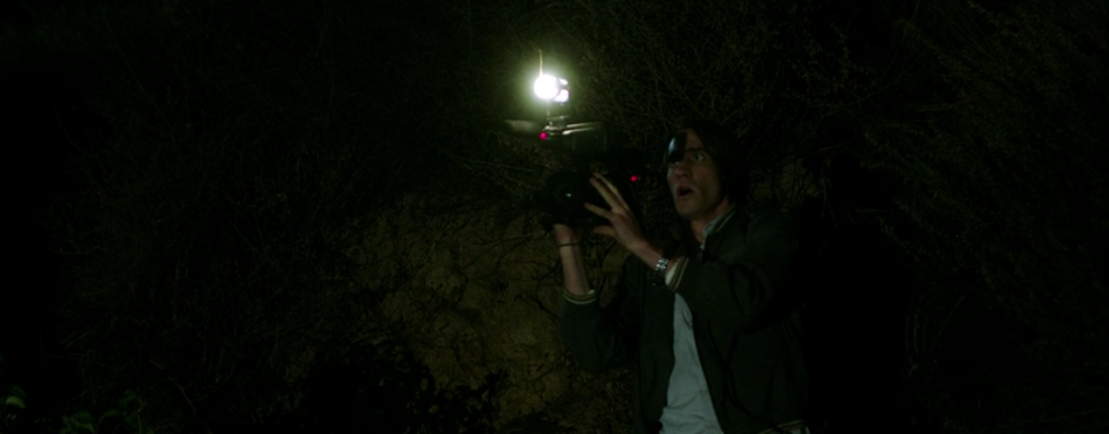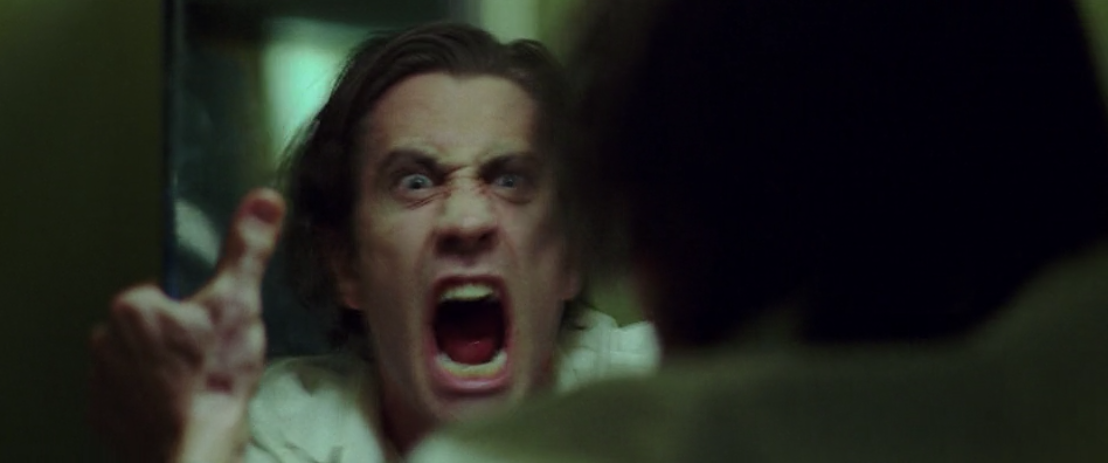In praise of Jake Gyllenhaal's crazy eyes
There's a reason so many of the actor's characters wear sunglasses. He's like the X-Man Cyclops, whose powers rest behind a sheen of black glass until unleashed.

A free daily email with the biggest news stories of the day – and the best features from TheWeek.com
You are now subscribed
Your newsletter sign-up was successful
Jake Gyllenhaal is my favorite actor to watch lose his mind.
When it happens, he hunches forward. He gestures desperately with his hands, as if begging his interlocutor to understand him. And, most mesmerizing of all, he widens his eyes. Sometimes he twitches them uncontrollably. Sometimes he rolls them, like a shying horse. Sometimes he lowers his brow and looks back up suspiciously, as if expecting, and defying, rejection. And sometimes, such as in Netflix's Velvet Buzzsaw, out today, his crazy eyes make the entire movie.
Gyllenhaal has found fortunate diversity in the roles he's been cast in, from his unraveling teenager in Donnie Darko in 2001, to the timid comic book artist on the trail of a serial killer in 2007's Zodiac, to an opportunistic crime scene videographer in 2014's Nightcrawler. But what unites Gyllenhaal's work is the little dash of insanity he puts in his eyes in every great role he plays. When the hype music starts up, and the connecting-the-dots montage begins, Gyllenhaal shines like a crazy diamond.
The Week
Escape your echo chamber. Get the facts behind the news, plus analysis from multiple perspectives.

Sign up for The Week's Free Newsletters
From our morning news briefing to a weekly Good News Newsletter, get the best of The Week delivered directly to your inbox.
From our morning news briefing to a weekly Good News Newsletter, get the best of The Week delivered directly to your inbox.
The art world satire Velvet Buzzsaw is Gyllenhaal's second project with director Dan Gilroy, who has utilized Gyllenhaal's putty-like face in ways both comedic and terrifying. In Buzzsaw, Gyllenhaal plays the influential critic Morf Vandewalt, who is the only member of his art world cohort that realizes mysterious paintings discovered in a dead man's apartment are possessed with, well, something bad. The film has plenty of problems, but Gyllenhaal isn't one of them; we watch him literally fall apart, his performance going from rigidly composed to completely unspooled as his colleagues are picked off one by one.
In the pivotal scene in which Gyllenhaal appeals to a disbelieving colleague (there is always This Scene in Gyllenhaal's crazy-eye movies), his irises are swallowed by the whites of his eyes. His entire face contorts into a memeable expression of pleading, so unlike his resting face that it makes my cheeks hurt vicariously. His eyebrows stretch, making his face larger. The whole display is so overwhelming, so turned-up-to-11, that I almost understand why Gyllenhaal's characters so often wear sunglasses — he's like the X-Man Cyclops, whose powers rest behind a sheen of black glass until unleashed.
Gyllenhaal's Velvet Buzzsaw performance has echoes in his earlier work with Gilroy, when he played the tragedy-chasing videographer Lou in Nightcrawler. In preparation for the performance, Gyllenhaal reportedly lost 20 pounds, striving to look like a starving coyote. That attention to the disturbing, hungry soul of his character extends to his eyes; they are glossy with entitled frustration for most of the film. When he informs a news producer that she will see him again, she replies "I believe you," sold as much by his intense, predatory expression as we are.
Likewise, we come to understand Lou's lack of morals through his eyes first and foremost. One of the most powerful scenes in the movie comes when he rearranges a body in a bloody car crash to get a better shot; disturbingly, his eyes bulge behind his camera, drunk on the image of his own orchestration. In another scene, when he loses his composure in the bathroom after getting scooped by a competitor, Gyllenhaal's lower lids scrunch, making his normally wide eyes beady, locked with their reflection in unmasked fury. While Lou unnerves everyone around him with his robotic business-babble, it is in his eyes that we see him embrace something that lies beyond morality.
A free daily email with the biggest news stories of the day – and the best features from TheWeek.com


Part of what makes Gyllenhaal's crazy eyes stand out so much is that his resting expression is particularly placid, almost a stoner calm. Even when delivering a viral, biting critique of Gilroy's pronunciation of "melancholy," his eyes hang lazy and disinterested. But even his neutral expression can be used to an advantage, as it is in 2013's Prisoners. Playing Detective Loki, Gyllenhaal deploys a subtle eye twitch throughout the entire movie, a somehow not-quite-normal tick that explodes when he is frustrated. It is incredible what this tick alone conveys — weariness, a lack of patience, even a whole past we don't know about, and never learn of. You get the sense from Gyllenhaal's twitching eye alone that he is a real character; the physical characteristic is not of consequence plot-wise, and is never remarked upon.
In Zodiac, from 2007, Gyllenhaal's crazy eyes are perhaps at their most understated, but no less important. His character, the comic artist Robert Graysmith, isn't so much unhinged as bent. On his own amateur hunt for the killer, he puzzles through ciphers with an intent focus, eyes searching and locked on his work. He dismisses his obsession in words — "I like puzzles" — while we see his expression light up at new information and revelations.
In one of his best scenes, as he pushes his theory of the killer with an unruffled Mark Ruffalo's Inspector Dave Toschi, Gyllenhaal bends forward, expression open and imploring. The intensity of his gaze breaks only when it searches the room as if looking for an approving audience after Toschi's dismissals. Director David Fincher is more sympathetic than many of Gyllenhaal's directors — the audience feels Graysmith is on the right path, and are frustrated by the police's resistance — so Gyllenhaal comes across as less crazy than determined. Still, there is that sprinkle of intensity in his eyes as he stares down Toschi, something slightly beyond reasonable interest.
What sets apart Gyllenhaal from being another Pepe Silvia meme, though, is the vulnerability in his expression. Human intensity is rarely beautiful; Gyllenhaal is decidedly un-star-like when he is contorting his face to yell at someone or twitching beside them in a car. His wild eyes are a question, a much-too-desperate plea for understanding, the kind of look that, when turned on you in real life, might make you unconsciously take a step back.
I'm startled by how often I find myself recoiling from something in his face. Through the screen it triggers that chirp of intuition that comes when someone stares slightly too long, slightly too intensely, slightly too wildly at their surroundings. Gyllenhaal's eyes are the tick-tick-ticking you realize you hear just before something explodes.
Jeva Lange was the executive editor at TheWeek.com. She formerly served as The Week's deputy editor and culture critic. She is also a contributor to Screen Slate, and her writing has appeared in The New York Daily News, The Awl, Vice, and Gothamist, among other publications. Jeva lives in New York City. Follow her on Twitter.
-
 Nuuk becomes ground zero for Greenland’s diplomatic straits
Nuuk becomes ground zero for Greenland’s diplomatic straitsIN THE SPOTLIGHT A flurry of new consular activity in the remote Danish protectorate shows how important Greenland has become to Europeans’ anxiety about American imperialism
-
 ‘This is something that happens all too often’
‘This is something that happens all too often’Instant Opinion Opinion, comment and editorials of the day
-
 House votes to end Trump’s Canada tariffs
House votes to end Trump’s Canada tariffsSpeed Read Six Republicans joined with Democrats to repeal the president’s tariffs
